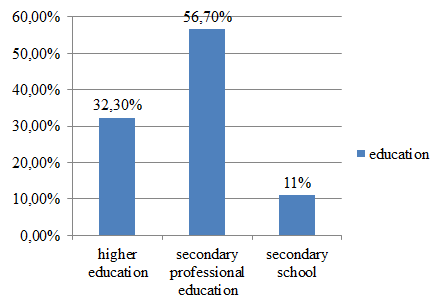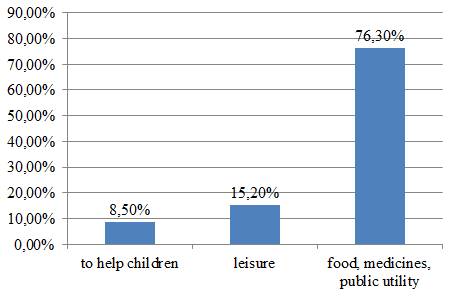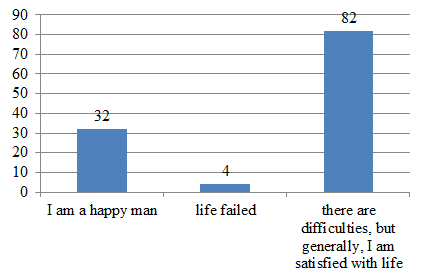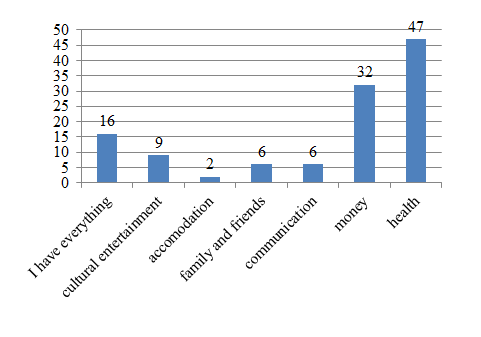Abstract
The authors of the paper analyze how marital status and level of education influence subjective economic well-being of an individual. 118 residents from Tomsk and Tomsk region took part in the research. All respondents were retired citizens. The presence or absence of children was the criterion to determine their marital status. Data processing and analysis were performed using the Excel descriptive statistics method. As a result of the questionnaire, a portrait of the respondents was identified: it is 55-65 years old retired who live in a small village of Tomsk region and have secondary special education. They have children who live separately but help their parents as they can. The main source of their income is a pension, which is spent mainly on food, domestic needs and medicines. They assess their standard of living as average. In general, the retired are satisfied with their life and would like to improve or change living conditions, to travel and be able to help children and grandchildren financially. General and specific features of subjective economic well-being among the seniors have been revealed. It was established that the most important factors in the determination of subjective economic well-being are the presence or absence of children, possibility to communicate with them as well as to render all possible assistance to them. Сlear correlation between subjective assessment of well-being and level of education of the respondents has not been established.
Keywords: Well-beingQuestionnairesWell-being EvaluationSeniorsRussia
Introduction
In any society emotional, psychological, financial, etc. well-being is the highest social value. A certain ideal of life organizes the most important interests of people and determines optimal values and views of an individual. The well-being of people in modern society is associated, primarily, with socio-cultural and civilizational opportunities of individuals for development and realization of their needs, interests and self-realization possibilities in social, psychological, emotional, information plan. Currently, the well-being of people in its various forms of expression is integral expression of the welfare level, an indicator of social activities effectiveness, a degree of satisfaction with vital functions and different kinds of needs as well as quality of life, social and personal comfort.
Issues of the relationship between the material side of life and psychological well-being of a person were considered mainly by Western science, which has accumulated rich theoretical and empirical material in this area. The psychological well-being was considered along with the notions of happiness, subjective quality of life, and satisfaction with life. However, lately, the quality of life and well-being issues are increasingly attracting attention of Russian researchers, both psychologists and economists due to social and economic changes of the last decades.
The notion of economic welfare as a scientific category appeared relatively recently, in the mid-20th century. Economic well-being was understood as a result of one`s own economic situation evaluation at the moment in relation to his/her or others financial position in comparison with his/her financial situation in the past. Now this concept is interpreted widely and considered as one of the main components of the overall subjective well-being of a person connected with financial and material sphere.
In economics, the concept of "well-being" is broader and includes subjective factors of spiritual and cultural needs satisfaction. The well-being is a human condition or the objective situation when a person has everything that characterizes his life favorably in the eyes of his family and himself. This state of human comfort includes not only financial security but also happiness in love and family life (Kozlova, & Polonskaya, 2016; Gasanov et al., 2016).
Materials and Methods
Besides psychological well-being researchers examine the concept of subjective well-being which includes four basic modes: material replenishment; personal self-determination; social self-determination and personal well-being.
A number of factors influence the level of the subjective well-being (Gasanov et al., 2016). Firstly, satisfaction with one`s financial situation. Secondly, presence of family. It determines the level of psychological comfort of the seniors and often the level of material well-being. The presence of other family members - husband (wife), children and grandchildren defines family happiness and becomes a sign of relevance.
Social-domestic factors (the presence of an apartment or room, accommodation accomplishment, proximity to medical and social welfare institutions, etc.) are very significant: how convenient and near community facilities are located, how urban transport routes and upgrades for the seniors are thought over. Finally, social well-being of the senior citizens depends on their leisure time, abilities and opportunities to establish and maintain good relations with other people, as well as the ability to transfer their resources into positive emotions and the important relationships for themselves.
Let us identify theoretical approaches applied in the study of the well-being:
- Targeted approach. It connects the subjective well-being with the ultimate goal. Supporters of this approach assert that the well-being appears in case of achieving the goal or object needs;
- Value approach. According to this approach, the activities of people determine the correlation between motive and result of the activity;
- Cognitive approach. This approach makes an attempt to explain the people`s propensity to experience subjective well-being by means of thinking and other regularities;
- Socio-psychological approach. It is based on a detailed study of social-psychological factors influence on subjective well-being; one of these factors is social standard;
- Personal and situational approaches. The tendency to see everything in a favorable light and to consider happiness as the sum of small pleasures (Kormishkin, & Zemskova, 2012).
Among domestic researchers dealing with the problem of the subjective well-being as phenomenon that expresses the relationship of an individual to the material aspects of his/her life, the work of V. A Khashchenko should be noted. The researcher worked out the concept of subjective economic well-being as a multidimensional formation, and this phenomenon is understood as the "basic component of economic consciousness that expresses personal attitude of an individual to his/her current and future material well-being "(Khashchenko, 2012).
Thus, researchers define and understand the subjective well-being in different ways. Nevertheless, they recognize the importance of this concept consideration as the integral indicator of human life.
The general issue of this research is to study the factors that determine the subjective economic well-being of an individual. The aim of this research is to study the effect of the respondents` education level and their marital status on subjective evaluation of the economic well-being of an individual.
The hypotheses of the study:
- The education level influences the evaluation of the subjective well-being;
- Presence / absence of children influences the nature of the economic well-being evaluation.
In order to test the hypotheses, the authors developed a standardized questionnaire, which includes a number of issues, covering both objective indicators of the well-being (e. g, presence of income), as well as indicators of subjective assessment of their well-being by the respondents. The questionnaire included questions of closed and open type. Below, there are the questions developed in the questionnaire.
1. Place of residence
2. Age
3. Education, occupation
4. Children
4.1. If there are, do they:
-help financially;
-help in the house;
-do not help
5. Do children live with you?
5.1. If not, how do you communicate with them
-by phone;
-on the Internet;
- other
6. Source (s) of income
7. The main items of expenditure
8. Subjective evaluation of your own level of living
-low;
-average;
-high
9. Subjective evaluation of quality of life
-I am a happy man;
-there are difficulties, but generally, I am satisfied with life;
-life failed
10. What is missing for happiness?
10.1. How would you spend money if you had it?
The study involved 118 respondents, residents of Tomsk and Tomsk region. The sample corresponds to the terms of representativeness. All respondents were of retirement age, i.e. the respondents were older than 55 years. The marital status was determined by the criterion of presence / absence of children.
Hashmi: (Hashmi, 2015) “A questionnaire is a general term to encompass all methods of data gathering in which every participant is required to answer the same set of questions in a prescribed sequence (DeVaus, 2002). Possibly not unexpectedly, the questionnaire comprises one of the most widely employed data gathering methods inside the survey strategy, as it offers an effective way of gathering answers from a substantial sample to the same set of questions (Robson, 2002). The design of a questionnaire varies depending on how it is dispensed, and specifically, the amount of interaction with the participants. As we mentioned, questionnaires are the primary data collection technique adopted in this research. They involve the use of online survey systems distributed to the respondent for them to choose from a multiple of answers. Questionnaires are usually less time-consuming and less expensive compared to other techniques, even though designing a questionnaire could be very stressful and difficult in terms of asking the right questions as it relates to the study. The questionnaire allows for greater anonymity. This means that the respondents have the chance to express themselves freely (Kumar, 2002). Today, most researches are widely carried out by using questionnaires. It is adopted for this research, as it is the most convenient way for data collection in a research study (Kvale, & Brinkmann, 2009).”
We applied the Excel method of descriptive statistics in data processing and analysis.
Results and Discussion
The respondents were distributed by place of residence as follows: 24% of the respondents were residents of Tomsk, the rest live in small towns (number of inhabitants up to 500 people) in the northern parts of Tomsk region.
The age of the respondents ranged from 55 years to 95 years. Most of the sample (51.7%) fell in the age group of 55-65 years.
Figure

The question of the presence of children and their help and cohabitation allows evaluating correlation dependence between the marital status and the well-being evaluation. Figure

Of those surveyed, 83% of the respondents live apart from their children; therefore the issue of communication is sufficiently significant. The majority (75.6%) indicated telephone as a way of communication. Probably, this way of communication is more familiar to the older generation. Nevertheless, more than 17% use the Internet to communicate with their children, and only a very small part (a little more than 7%) responded that they communicate through traditional letters or go to visit each other.
Among sources of the incomes, pension is an expectable leader (almost 80%). It can be explained by the age of the respondents. However, there are also answers "children help financially", what is supported with evidences presented in Figure
Figure

The following figures present the subjective evaluation of the level and quality of life. Despite the fact that these parameters can be estimated by using objective criteria, we proposed the respondents to evaluate their level and quality of life basing on their own sensations. To estimate that, it was necessary to choose one of three answers. The results are shown in the Figures
It comes to our attention that more than 70% of respondents consider their level of life as average and high, despite the fact that most of them live on a pension and basically spend income on food and medicines. It may indicate that the income for the seniors is not a key factor for the well-being evaluation.

According to the index "quality of life" those respondents who chose the answer "life failed" are people whose only source of income is pension; their children do not help them and do not communicate with them.

It is worthwhile noting that the majority of the respondents who chose the answer "I am a happy man" live in Tomsk, i.e. have more comfortable conditions for living, various leisure, greater opportunity to communicate with their relatives in comparison with the residents of the region, where there is no access to the Internet, and sometimes to mobile communication.
The last question of the survey "What is missing for happiness" was open, the respondents formulated their response. The results are shown in Figure

Those respondents, who said they do not have enough money to be happy, indicated how they would spend the money in an open manner (see Figure

Conclusion
Summarizing the results of the survey, it is possible to create a portrait of a respondent for the sample. It is a 55-65 year old retired resident of Tomsk region, who lives in a small village, has secondary professional education and has children who live separately, but help as much as they can. The main source of income is pension that is spent mostly on food, domestic needs and medicines. He/she evaluates his/her level of life as an average, generally satisfied with life and would like to improve or change living conditions, to travel, to be able to help financially their children and grandchildren.
A clear correlation between the subjective well-being evaluation and the level of education of the respondents was not found. Although it should be noted that mostly people who had only secondary education valued at a low rate their well-being, whereas respondents who feel happy often have higher education.
Acknowledgements
The authors are grateful to Maksim V. Sushkin, the deputy director of the medical maintenance organization "Zdorovje" for assistance in organizing the survey.
References
- DeVaus, D. (2002). Surveys in Social Research,(5th ed.), Routledge, London.
- Gasanov, M.A. Gasanova, N.V., & Zhavoronok, A.V. (2016). Information Technologies in Ensuring Continuous Wellbeing of the Person The European Proceedings of Social & Behavioural Sciences, VII, 323-336.
- Hashmi, A. (2015). Developing an assessment model For the implementation of market orientation In Saudi construction organizations, PhD Thesis, Salford, UK, 99-100
- Khashchenko, V. А. (2012). Psychology of economic well-being, Institute of Psychology RAS, Moscow.
- Kormishkin, E.D., & Zemskova, E.S. (2012). Population quality of life as the form of expression of economic growth Izvestya of higher educational institutions, 4, 17-24.
- Kozlova, N. V., & Polonskaya, M. S. (2016). Social and Economic Components of Well-being. The European Proceedings of Social & Behavioural Sciences (EpSBS), 7, 144-149.
- Kumar, K. (2002). Market orientation, organizational competencies & performance: an empirical investigation of a path-analytic model, Journal of American Academy of Business, 1(2), 371-376.
- Kvale, S., & Brinkmann, S. (2009). Interviews: Learning the craft of qualitative research interviewing. Sage.
- Robson, C. (2002). “Real world research: A resource for social scientists & practitioner-researchers”, Blackwell, Oxford, 2.
Copyright information

This work is licensed under a Creative Commons Attribution-NonCommercial-NoDerivatives 4.0 International License.
About this article
Publication Date
20 July 2017
Article Doi
eBook ISBN
978-1-80296-025-9
Publisher
Future Academy
Volume
26
Print ISBN (optional)
Edition Number
1st Edition
Pages
1-1055
Subjects
Business, public relations, innovation, competition
Cite this article as:
Zhavoronok, A., Bokhonnaya, M., Dariya, K., & Palkina, E. (2017). The Subjective Well-being Evaluation of Seniors using Questionnaires. In K. Anna Yurevna, A. Igor Borisovich, W. Martin de Jong, & M. Nikita Vladimirovich (Eds.), Responsible Research and Innovation, vol 26. European Proceedings of Social and Behavioural Sciences (pp. 942-950). Future Academy. https://doi.org/10.15405/epsbs.2017.07.02.122

